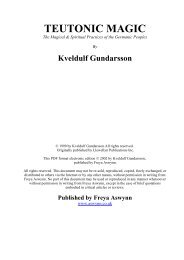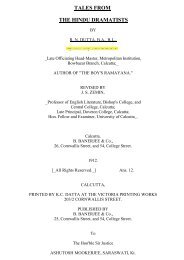Untitled - Awaken Video
Untitled - Awaken Video
Untitled - Awaken Video
You also want an ePaper? Increase the reach of your titles
YUMPU automatically turns print PDFs into web optimized ePapers that Google loves.
Chapter 6. The Sky 145<br />
they could age albeit very slowly, and are kept youthful only by eating the apples<br />
of the giantess/ Goddess, Iðunn, wife of the God of Poetry, Bragi. They also knew<br />
that their Gods held no immunity against death. Balder, son of Óðínn and Frigg,<br />
was killed by the blind God, Höð, burnt on the funeral pyre, and now resides in the<br />
underworld Halls of Hel, Goddess of the Land of the Dead. Ragnarök, the battle<br />
that will destroy the Universe at the end of time will bring many of the great Gods<br />
to the end of their lives.<br />
How different from the all-powerful God of the Christians. So different, in fact,<br />
that one of the great ecclesiastical questions supposedly to help convince the Heathen<br />
to convert was “If your Gods are so powerful then why do they require sacrifice?”<br />
The Christian answer to this question was obvious: “Since the Heathen Gods are not<br />
omnipotent, and the ‘true God’ is, it follows that the Heathens are worshiping mortal<br />
demons who have been deceiving the ignorant barbarian, and who are ultimately<br />
subject to Jehovah’s judgement in the end times; therefore, it is Christian duty that<br />
the Heathen barbarians be saved from eternal damnation as a public service of the<br />
Mother Church.” In the year 1014 CE, Wulfstan, Archbishop of York, preached the<br />
following as part of his “Sermon on False Gods”:<br />
“Many other Heathen Gods also were devised in various ways, and Heathen<br />
Goddesses likewise held in great honor throughout the world to the ruin<br />
of mankind; but these, though, are reckoned the most important in paganism,<br />
although they lived foully in the world. And the scheming Devil, who always<br />
deceives mankind, brought those Heathen men into profound error so that<br />
they chose as Gods for themselves such vile men who had made their vile<br />
lust a law for themselves and for as long as they lived spent all their lives in<br />
uncleanness.<br />
But blessed is he who completely scorns such affairs and loves and honors<br />
the true God who created and fashioned all things.” 6<br />
Differences, which were tolerated by the ignorant barbarian as belonging to a personal<br />
viewpoint, were believed by the more enlightened Christian to be but evil<br />
deceptions created by the Devil in his continuing befuddlement of mankind. It is<br />
interesting to note that punishment or death for “heresy” and “blasphemy,” were<br />
not punishable crimes during the Heathen Age; the burning of heretics was a phenomenon<br />
which came later and was associated only with the Holy Mother Church<br />
and the coming of the Prince of Peace to northern Europe.<br />
Actually, the confusion suffered by the Christians as to why the Heathen so<br />
tenaciously held onto his set of older beliefs rather than automatically converting<br />
6 Swanton, Michael, translator and ed., Anglo-Saxon Prose (Everyman’s Library; London)<br />
1993, p. 187.
















